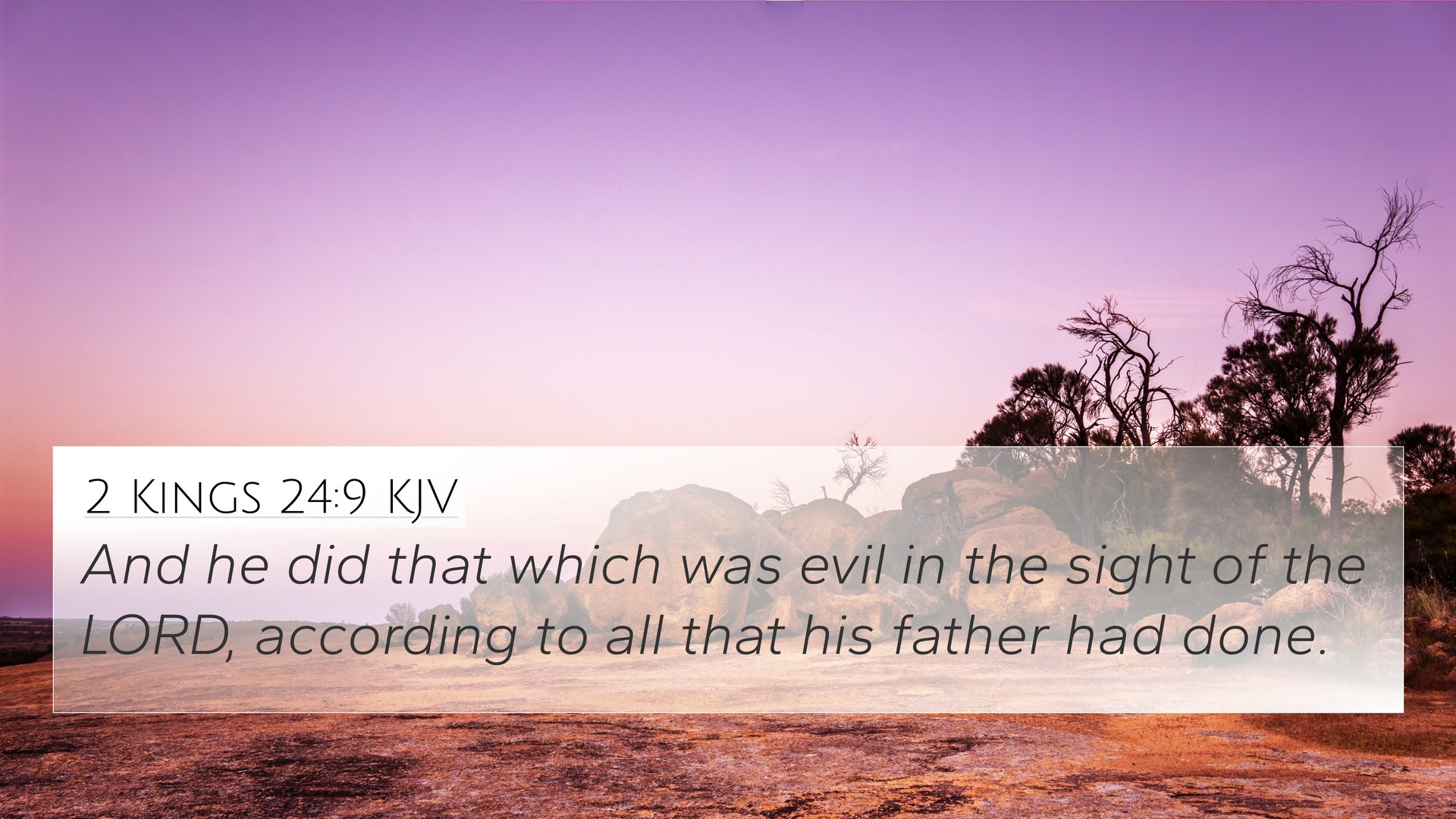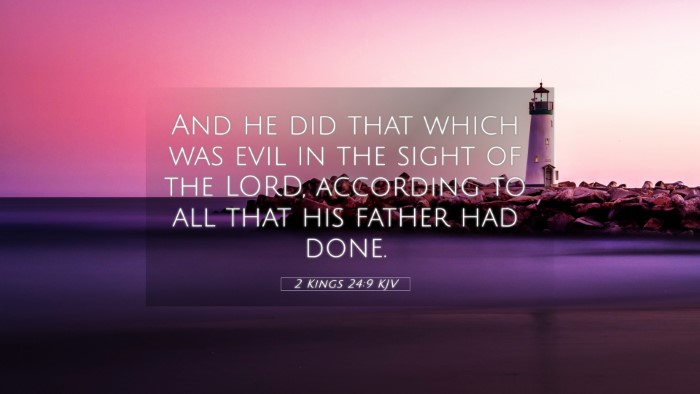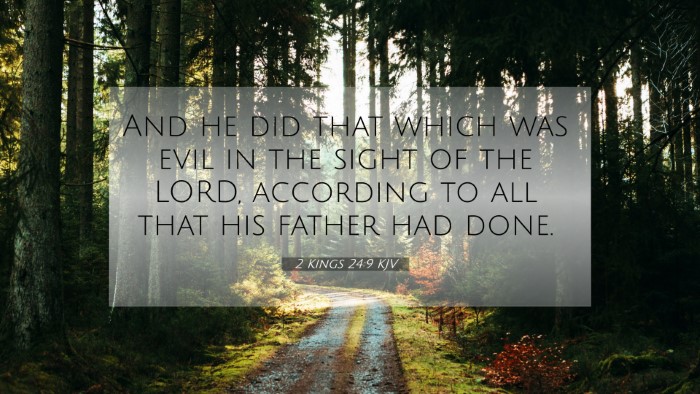Old Testament
Genesis Exodus Leviticus Numbers Deuteronomy Joshua Judges Ruth 1 Samuel 2 Samuel 1 Kings 2 Kings 1 Chronicles 2 Chronicles Ezra Nehemiah Esther Job Psalms Proverbs Ecclesiastes Song of Solomon Isaiah Jeremiah Lamentations Ezekiel Daniel Hosea Joel Amos Obadiah Jonah Micah Nahum Habakkuk Zephaniah Haggai Zechariah Malachi2 Kings 24:9 Similar Verses
2 Kings 24:9 Cross References
And he did that which was evil in the sight of the LORD, according to all that his father had done.
Uncover the Rich Themes and Topics of This Bible Verse
Listed below are the Bible themes associated with 2 Kings 24:9. We invite you to explore each theme to gain deeper insights into the Scriptures.
2 Kings 24:9 Cross Reference Verses
No cross reference images were found in our system for this Bible passage.
2 Kings 24:9 Verse Analysis and Similar Verses
Understanding 2 Kings 24:9
In 2 Kings 24:9, we read that "And he did that which was evil in the sight of the Lord, according to all that his father had done." This verse highlights the moral and spiritual decline prevalent during the reign of King Jehoiachin of Judah. The importance of this verse lies in its relationship to the broader narrative of Israel's kings, their fidelity to God, and the eventual consequences of turning away from His commandments. Through various public domain commentaries, we can better understand the implications of this passage.
Insights from Commentaries
-
Matthew Henry's Commentary:
Henry emphasizes the repeating pattern of evil among Judah's kings, suggesting that Jehoiachin's actions were a continuation of his father's (Jehoiakim) sinful legacy. He notes that this behavior reflects a profound disregard for God's commands, which ultimately leads to judgment and desolation.
-
Albert Barnes' Commentary:
Barnes elaborates on the phrase "did evil," indicating that the term encompasses a range of sinful behaviors that were not just actions, but heart conditions. He refers to Jehoiachin's reign as a stark warning against complacency in moral and spiritual matters, showing how leadership impacts the entire nation.
-
Adam Clarke's Commentary:
Clarke discusses the broader theological implications of the verse, noting that Jehoiachin's evil deeds signify a disconnect between the king and his responsibility to God. He ties in the historical context of Babylonian captivity, suggesting that Jehoiachin's downfall was a direct consequence of ignoring divine statutes.
Bible Verse Cross-References
This verse relates to various other Biblical passages that discuss the themes of leadership, sin, and divine judgment. Here are some pertinent cross-references:
- 2 Kings 21:16: Describes Manasseh's sins which led to Judah’s downfall.
- 2 Chronicles 36:9: Provides an account of the evil deeds of Jehoiachin.
- Jeremiah 22:24-30: Prophecies against Jehoiakim and his descendants.
- Isaiah 39:5-7: Foretells the exile of Jehoiachin's descendants.
- 2 Kings 24:3: Indicates the Lord's anger against Judah due to their sins.
- 2 Kings 25:27-30: Discusses the eventual fate and restoration of Jehoiachin in Babylon.
- Romans 1:21-22: Connects to the consequences of rejecting God’s truth.
- 1 Kings 16:30-33: Another example of evil kings in Israel.
- Ezekiel 21:25-27: Prophesies judgment against the royal family of Judah.
Thematic Bible Verse Connections
The themes of sin and leadership found in 2 Kings 24:9 resonate throughout Scripture. Key points to consider include:
-
Connection to Jewish History:
Jehoiachin's reign and subsequent actions must be viewed through the lens of the historical context of Israel, particularly the divided kingdom and the faithfulness of God despite human infidelity.
-
The Call to Righteousness:
The recurring cycle of evil kings culminates in God’s call for repentance and leads to the promise of a future righteous king, connecting to messianic prophecies in the Old Testament.
-
Consequences of Sin:
The verse serves as a stark reminder of God's judgment against unfaithfulness. It reinforces the principle that leaders are accountable not only for their actions but also for the spiritual plight of their people.
Cross-Referencing Biblical Texts
The accounts of Jehoiachin, his father's reign, and their implications are rich grounds for cross-referencing throughout Scripture. Tools for Bible cross-referencing can aid in studying these connections, promoting a deeper understanding of God's overarching narrative.
Comparative Bible Verse Analysis
-
Old Testament Examples:
Links between kings such as Manasseh and Ahaz demonstrate the consistent theme of failure leading to divine retribution, which mirrors Jehoiachin's predicament.
-
New Testament Reflection:
The New Testament highlights the contrast between earthly kings and the King of Kings. Jesus embodies the fulfillment of righteousness, unlike the lineage of Israel's most notorious rulers.
Conclusion
In sum, 2 Kings 24:9 serves as an important lesson in the narrative of Israel's kings. Through engagement with the commentaries of Matthew Henry, Albert Barnes, and Adam Clarke, and by examining related scriptures, we gain insight into how the failure to follow God leads to both personal and communal consequences. This encourages believers to seek a deeper understanding of their faith and the importance of righteous leadership.


